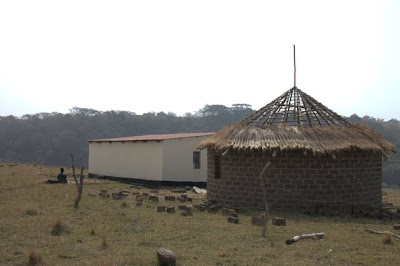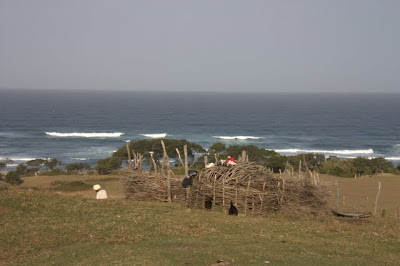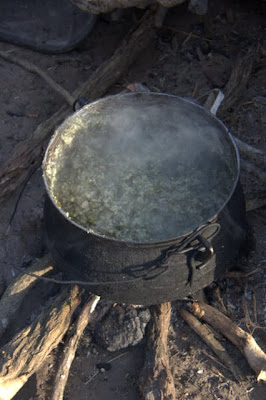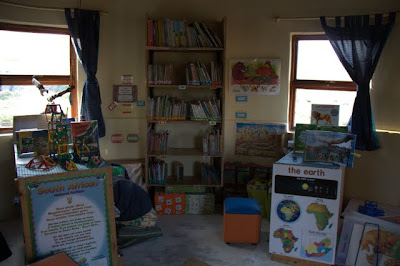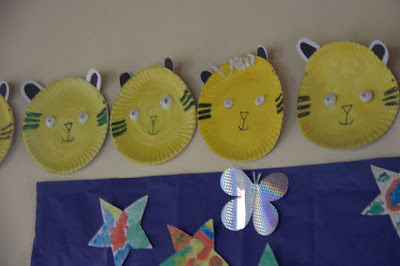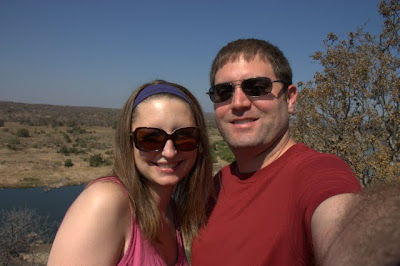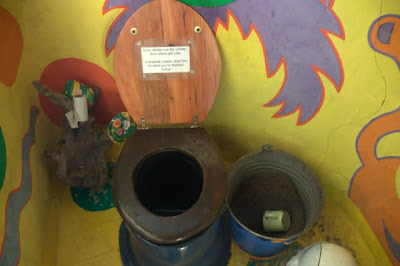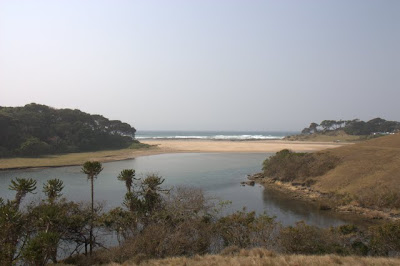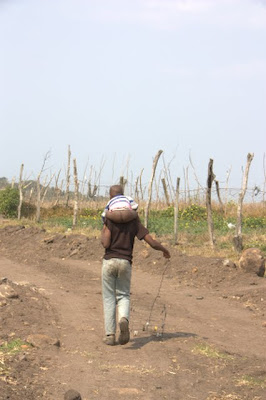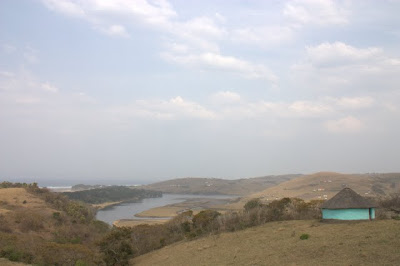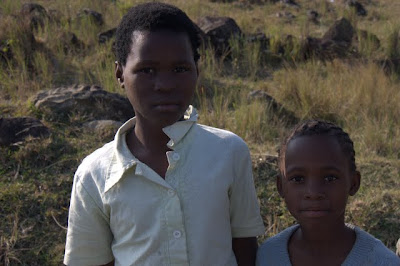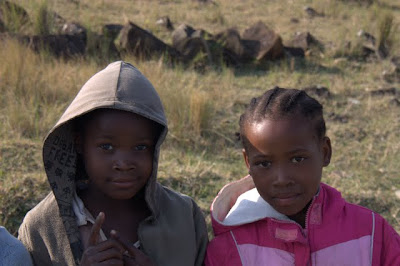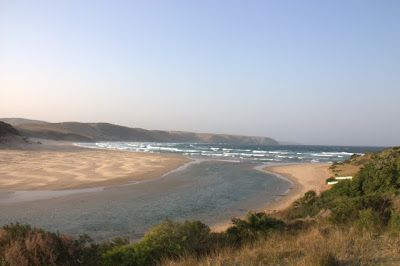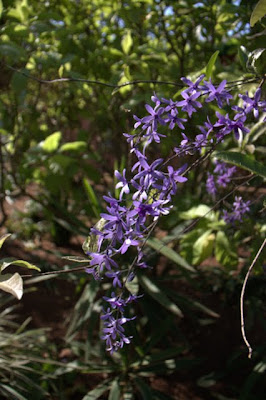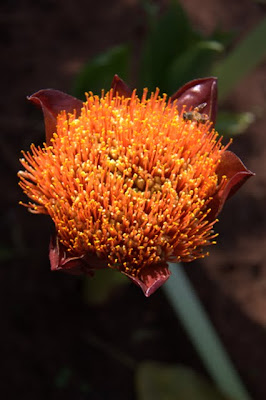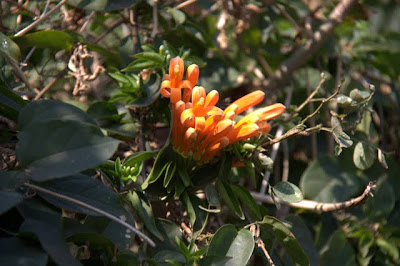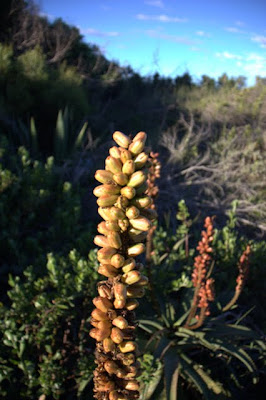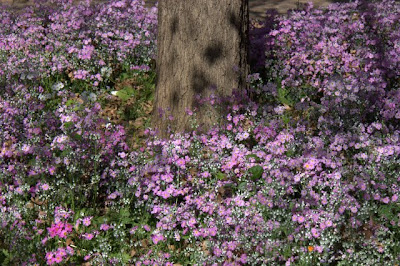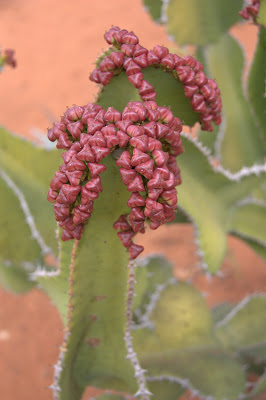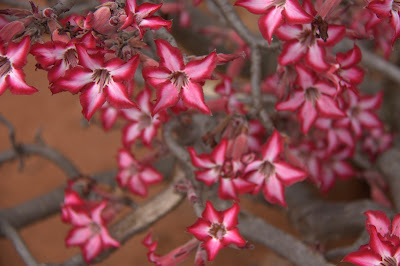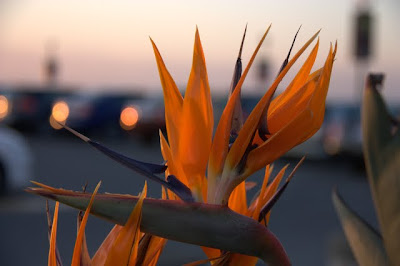Bulungula, Part Three and The End
While we were at Bulungula, we opted to go on a tour of the village. The tour was led by one of the girls who lived in the village. (For the life of me, I cannot remember her name, so I will just have to refer to her as our tour guide. I have a bad habit of hearing someone’s name, and promptly forgetting it two seconds later. This bad habit is exacerbated by any names that are extra foreign to my ears). We were joined on the tour by Abraham and Josephine, two Americans who were practically our neighbors. They are from Columbus, Ohio, and are also traveling around the world. (By the way, Abraham and Jo – if you are reading this, send me an email. We lost your contact information!)
The village is made up of Xhosa people. The language that they speak is also called Xhosa. When I read that the language features clicking sounds prior to coming to Bulungula, I naively assumed that everyone spoke with just clicks, which I thought would be impossible to understand. As usual, my idiotic assumptions were proved wrong once again. When speaking Xhosa, certain letters are accentuated with a click of the tongue.
People in the village lived in rondavels, not unlike the ones in which we were staying. The floors are made up of cow dung, which is periodically reapplied to keep the dust down. The roofs are thatched together from natural materials. I only took a few pictures on the tour. Even though I knew the whole community is part of the Lodge and is a willing participant on the tour, it still felt odd to intrude and ogle at people’s lives anymore than we already were.
Our first stop on the tour was to visit the healer, an elderly woman whose hut was in a prime location with seaside views, demonstrating her important role in the community. I wasn’t quite following what she did, exactly, but got the gist that she has dreams, which helps her to heal people. We sat on the ground with her next to the chicken coop, trying to avoid sitting directly in the chicken poop, and had as much back and forth conversation as one can have between people who speak English and people who speak Xhosa. Our guide occasionally translated, but didn’t facilitate a lot of back and forth, which made for a lot of awkward smiling.
Next, we went to visit a family in a hut. Josephine and I were promptly directed to join the women sitting on a mat on the cow dung floor, while Sean and Abraham got chairs on the other side of the room. Apparently once a woman marries, she can no longer sit on the same side of the room as men. One of the women showed Josephine and I how to grind corn on the giant stone that they use to prepare their meals. I, at least, failed miserably. I ended up just sort of chucking the little stone towards the big one, instead of making graceful swipes. We asked some questions which our tour guide relayed, and learned that about 11 people lived in the hut, from newborn to adult. They all slept on mats on the floor. On one side, they had shelving with some staples for food – corn, rice, etc. – and on the other side, three chairs, but that was it.
After visiting for about twenty minutes, our tour guide told us it was time to move on. We said good-bye and left the hut. On our way out, we paused outside to look at their dinner cooking on the fire. The people in the village typically eat various forms of pap, which is a thick porridge like dish with spinach or cabbage.
All four of us were under the impression from our tour guide that we were moving on to another place in the village, but she turned and went back into the rondavel, motioning for us to follow her. Sean and Abraham were once again directed to the chairs, and Josephine and I were once again directed to the floor. I thought we were leaving? I heard Abraham say in a half-whisper to Sean. It didn’t take long for the realization to set in that we were now joining them for dinner. I’m not sure how that happened. Did something get lost in translation? Did we unknowingly agree to this? One of the woman brought in the pot of pap that had been cooking outside. She dished out some of the pap into one bowl, and handed it to Sean, Abraham, and a teenage boy, along with three forks. Oh, I guess we’re staying for dinner, Abraham said. Guess so, said Sean.
As soon as a woman brought over a dish of brownish looking water, I started to suspect what was going to happen next. The women passed the dish of water around, using it to clean their hands. I’m not sure what was worse; using that water to “wash,” or just eating without washing even though we just had been sitting outside next to the chicken coop. Josephine and I accepted the water and gingerly stuck our hands in for a brief moment before smiling awkwardly and passing it on. Meanwhile, from their elevated position across the room, Sean and Abraham were eyeing up the water and wondering what was going on. Why do they get water and we don’t? Sean wondered out loud as a woman dumped a pile of the pap into a large bowl. As it was set in front of the group of women on the floor, Abraham chuckled and said with a smirk, Because we get forks and they don’t!
As the boys shared amusement, the group of women started digging into the communal bowl of pap with their hands and eating it. Josephine and I exchanged looks and reluctantly grabbed as small of portions as we could without looking rude and put it in our mouths. Abraham, counting on the inability of everyone in the room except us to speak English, was spot on when he said out loud, Wow, this tastes just like sand. The pap was gritty and mushy at the same time. Other than a taste of boiled spinach, it was near flavorless. I concentrated on sticking to a portion of the bowl closest to me that I was pretty sure was untouched by anyone else, but as the pap dwindled, so did any hopes of sticking to one segment.
While everyone was eating, the room was silent, except for a few comments exchanged back and forth between Sean and Abraham. I stole a glance at Josephine, and was relieved to see that she, too, was eating tiny bites spaced out from each other as much as possible. Meanwhile, the other women were scooping up much larger bites much more quickly. I felt awful eating their dinner, when they have so little to eat and when we had a big, delicious dinner waiting for us back at the lodge. I felt awful for hating the food, when this is what they eat for all of their meals every single day.
My reverie was interrupted by one of the women speaking to Josephine in Xhosa. Josephine, likely unsure what she was saying, just smiled and tried to pantomime that the temperature of the pap was hot. One of the women got up, got a smaller bowl, and scooped some pap into it. She handed it to Josephine and motioned for her to go outside. Unsure about what was going on, Josephine stood up and said, okay, I guess I’ll take this outside. She was gone for about a minute, and then returned and set it back down. Thanks, now this is cooler, she said to the women, but looking at me with a what-in-the-hell type expression. She then said, why don’t you help me eat out of this bowl, since it is cooler and all. I nodded. How much of this do you think we have to eat? I muttered out of the corner of my mouth. I have no idea, she muttered back. I felt relief to only have to share a communal bowl with Josephine. Meanwhile, this made no sense, considering I had just met her about an hour before.
At some point, we decided we had ate an acceptable amount and offered our bowl to the other women sitting around us. Our tour guide then told us it was time for us to move on. We thanked the family for sharing their dinner, and then said goodbye for what we hoped was the last time.
We then toured the classrooms in the village. The schools are funded by Woolworths, a large department and grocery chain throughout South Africa. In contrast to the rondavels, the classrooms were bright and sunny.
After our classroom tour, we went to visit the headman of the village. We joined him outside, where he was sitting with his children. With the help of the translator, we learned a little bit about his role in solving village disputes. After the visit with the headmen, we went to one of the village’s shabeen. Like many villages, the locals brew their own beer. They weren’t brewing on this particular day, so we didn’t get to try any. Which probably isn’t that disappointing, based on what I have read. I was expecting the shabeen to be a like a bar, just in a rondavel, with people sitting around on mats or chairs. The one we visited looked to be someone’s house. The hut was much more chaotic and messier than the one in which we tried the pap. There were people everywhere – women, small children, really small children, and the only adult man we saw in the village other than the headman. The babies in the village don’t wear diapers, and the one in this hut crawled around the dung floor with only a shirt on. There are also animals everywhere. Like the baby, cats and chickens crawled around the rondavel. In one “corner” (there are no actual corners, since the rondavels are round) we saw the pot where they normally brewed the beer. The local corner dive bar at home, this is not.
Most of our visits with the villagers, who were all black, were focused upon Josephine. The people in the village were fascinated by her. She is American, but her family’s national origin is Taiwanese. This caused much confusion with the villagers. They want to know where you are from, our guide related. We’re all from the United States, one of us would answer. Our guide relayed the information, and always came back to Josephine with another question: But where are YOU from? A steady stream of white Americans and Europeans must go through the village as part of the tours, but people who are Asian in appearance must be less common. Apparently an Asian woman had traveled to Bulungula some time back. You look like her, our guide translated to Josephine. You are so beautiful.
When we returned to the lodge, suddenly the compost toilets, rocket showers, and beds with mildewy pillows started to look like luxuries. The people in the Nqileni Village have no toilets at all, no running water, no electricity, no clean drinking water, no access to healthcare. Because a municipal access road has never been built, the nearest health clinic is hours away on foot or by 4×4 vehicle (which, of course, few people have). Over half of the approximately 750 people in the village are children. The vast majority of the people in the village do not have basic literacy or numeracy skills. Other than working for the lodge or with a business supported by the lodge, their only source if income is to send an adult male to work in the mines in Johannesburg, over 12 hours away. It is sobering to encounter such poverty close up. I am glad for a place like Bulungula, which at least provides some income and attention to people ignored by government. They also have started the Bulungula Incabator, a non-profit organization to try and address some of the problems in the Nqileni Village.
6 months on the road!
Six months ago today, we left Pittsburgh to start this crazy journey. Our travels took us briefly to New York City, then to 3 continents and 17 countries: Spain, France, Morocco, back to Spain, to Portugal, again back to Spain, to the Czech Republic, Germany, Slovenia, Croatia, Hungary, Poland, the Republic of Ireland, Northern Ireland, South Africa, Jordan, United Arab Emirates, South Korea, and Japan. It has been a wild and surreal 6 months. Sometimes I have to remember to stop and take it all in. By this point, we are used to the constant movement and being surrounded by sights, people, food, and language that are completely foreign. The other day, I noticed myself just walking down the street in Fukuoka, Japan, like it was any city, in any country. I had to stop and remind myself, holy crap, you’re in Japan!
Our plans for the next six months are mostly the same as our original plans, although we already cut out China because we just don’t have time. We’ll be in Japan until October 27, when we fly to India. We’ll then head to Southeast Asia (Thailand, Cambodia, Laos, Vietnam). We hope to finish up the trip in New Zealand, Australia, and possibly some island in the South Pacific. There’s talk of taking the long way home by way of a cross-country road-trip once we hit American soil, but we’ll have to see. There is a certain furry gray cat we’ll be eager to be reunited with and friends and family we miss.
Since I know you are starting to miss us as well, don’t forget you can track our progress here. We’ve updated and improved the map since its creation. In addition to showing our detailed itinerary by date and city, it also lists the places where we’ve stayed. Starting with South Africa, I’ve started listing a brief review of each place we’ve stayed. Finding a place to stay is a neverending task for us, so hopefully it will help someone in the future.
A while back, I promised a packing list and updates to how things have faired. Since I procrastinated so long, you get two in one. We’re thinking about ditching some more things before we leave Japan since we will be in hot weather climates for about 4 months. I will try to note those deletions.
Thanks for reading along!
Bulungula, Part Two
So when we last left off, I was in dire need of the bathroom. TMI, I know, but it is relevant to this story because as I mentioned in the beginning, Bulungula is an eco-lodge. This doesn’t just mean that you reuse your towel or sheets in the name of greenness; Bulungula is actually is carbon-neutral. This article from the Guardian describes their efforts best:
The lodge runs on solar and wind power and any CO2 emissions generated through gas and electricity usage are offset by the planting of slow-growing forest trees. Even the bread is baked in a solar oven – a huge mirrored dish that is tipped when needed to face the sun. Paper and cardboard are burned on-site (rather than driven all the way to the nearest recycling point) and all other rubbish is taken to the nearest town, Mthata. Clean water is collected from a spring or a rain tank, and all dirty water is soaked up by the surrounding banana and papaya trees, to produce fruit that is turned into smoothies using a bicycle-powered blender. The compost toilets are non-flushable, and the “rocket showers” are fuelled by paraffin. You simply pour it into the bottom of the drainpipe, throw in a handful of toilet paper, light it and voilà, you have a three-minute hot shower.
More aspects of Bulungula that make my idealist inner treehugger happy.
My practical self, however, was wondering what all of this eco-stuff was like in practice. I was pleasantly surprised. Turns out the compost toilets weren’t so bad. My criteria for judging a bathroom include a clean place to squat, toilet paper, and soap to wash your hands, and the Bulungula bathrooms have all of those things. The toilets look like regular toilets, but have two compartments: one for number one and one for number two. The two scoops of sand you dump in after using making use of the second compartment are supposed to cover up the smell, which worked, albeit not completely. The hardest part is compartmentalizing your bathroom usage, but it all worked out.
The rocket showers referred to above are quite interesting. I had some confusion over the right amount of paraffin to pour into the pipe, so I was a little concerned when the small fire turned into a large roar. I was certain throughout my entire shower that the pipe was going to combust, particularly when fire periodically shot out the opening. Of course, you are naked while you were pondering whether there is going to be an explosion, which means you are reluctant to check with anyone to see whether there is, indeed, a problem. Other than fear for your personal safety, the rocket shower does as promised and produces at least a trickle of hot water for your cleansing needs.
Maybe I should have focused my efforts on showering before I blew up the place instead of taking pictures
The rondavels where we stayed were simple and actually pretty nice, considering the ocean was just over the hill, as long as I ignored the fact we were standing on a cow dung floor.
Of course, being in the middle of nowhere, everything is just immensely more peaceful, and we spent time just soaking in the scenery and quiet.
The center of the lodge is the common building. At any given time, whether day or night, people from the village are hanging around the lodge, and some of them, including little kids, eat some of their meals there. Both nights we had delicious African meals for under $10 prepared by some of the villagers in the common lodge. The people at the lodge anticipate almost all of your needs, and one of those needs, of course, is beer. The lodge has beer and other beverages available for purchase (although not bottled water, so if you don’t want to drink the rain water they’ve collected, bring your own). The first night, we felt somewhat shy, as we mostly were the only non-Xhosa speakers around. After dinner, we were encouraged to join the drum circle that some of the locals started. After learning that I have no rhythm, as I expected, we opted out and went back into the common lodge, where we struck up a conversation with the guy from East London who picked us up on our way in. The vibe on the second night was totally different than the first, because we were joined by about 10 English-speaking American and European travelers. Both nights turned out to be quite fun.
Not everything at Bulungula is all puppies and rainbows, however. Our bed was filled with the overwhelming scent of mildew. I finally isolated the smell to the pillow. Removing the source made for uncomfortable sleeping, but at least the smell was gone. And as I would soon learn, seeing how the people lived in the village put any complaints like this in perspective.
It also was frustrating to get a clear answer, sometimes. This seems to be part and parcel of the experience, as this blog writer wrote back in 2007.
Now, having waxed about the place, Bulungula is not flawless in the way a time-challenged globe-trotting citizen of the world might like. Not everything happens on time (ok-most things don’t happen on time), not everything works all the time, and there are few English speaking people around to help you out with whatever you might need help with. So you may not get everything you want, and what you do get may not happen on time or in precisely the way you wanted or expected it, but you will get an African experience.
By “African” I don’t mean that things work on “African time” (wink, wink with a condescending smile…) or that all the people who work there are black and local or that the food is traditional local fare. (None of those things are always the case, by the way.) What I mean is that you’ll get an authentic collision of worlds at Bulungula, with all the frustrating, spontaneous, eclectic, maddening, serendipitous and perplexing implications, and very little assistance in dealing with it – for better or worse. People with deeply traditional rural African cultural upbringing (Xhosa, to be specific) and little formal education are in their environment and you (likely to be Western and/or urban, well educated and affluent by global standards) are coming to see them on their terms. Bulungula is a gateway, a transitional space, a facilitator. But don’t expect much help in telling you what you ought to do, how you ought to approach any particular situation, or how you should think about whatever you might encounter.
We saw this mostly on our village tour (more to come about that later), and also with the contradictory guidance to get into the place. We also couldn’t get a straight answer about where exactly we left our car. We wanted to retrieve our car so we wouldn’t have to take the shuttle out of there the next day, so we attempted to take the “short-cut” to general store where we left our car. Again, the directions were along the lines of go down there, turn left, follow the 4×4 tracks, turn right, etc. and once again, we got promptly got lost. Although there were brief moments of frustration (mostly by me) as we chugged along in the hot sun without water having absolutely no idea where the general store was, the walk turned out to be an adventure itself. As are most things on our trip, the more something puts us out of our element, the more interesting and rewarding it turns out to be.
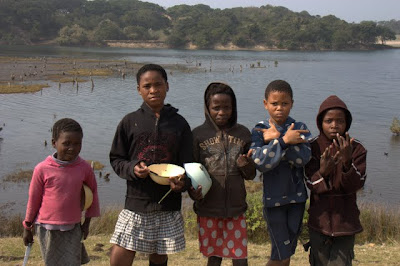
Children walking back to the village after eating breakfast at Bulungula. I also took their individual pictures because they were all quite eager to show off their signs.
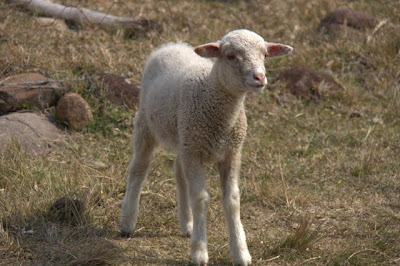
A lamb we encountered along the way. Lambs and sheep are kept by the villagers to eat on special occasions.
Bulungula, Part One
There’s a place on the Wild Coast of South Africa that I am sure will stack up to be one of the most memorable and most unique places we stayed on this trip. The place is Bulungula Lodge, an eco-friendly and fair trade lodge totally off the grid located in a remote area of South Africa. The Lodge is the type of place that can restore a little bit of my liberal, tree-hugging, idealistic heart that practicing law killed off with cynicism.
The Lodge was created by Dave Martin, a well-traveled man originally from Cape Town who wanted to put his ideals into action. Created in 2004, the Lodge is a partnership between Martin and the local Nqileni village, made up of Xhosa people. The village owns the riverfront/oceanfront land occupied by the Lodge, and 40% of the Lodge itself. That means locks aren’t needed on the doors of the huts for the guests and people won’t hassle you for money, because everyone has a vested interest in the business. The village selects the neediest people to work at the Lodge, such a widow who needs the income. In addition to the creation of jobs at the Lodge itself, the Lodge spawned a number of 100% community-owned and operated businesses. Guests have the opportunity to engage in horseriding, canoeing, or fishing with a guide; eat at a pancake restaurant in the village; get a massage; go on a tour of the village; spend time and work with the village women; or learn about herbs from the herbsman. Other than the Lodge, there is no other place for employment anywhere in sight. Many of the village men live in townships in Johannesburg most of the year, working in the mines and sending meager incomes back home.
The journey to get to Bulungula Lodge is part of the experience in of itself. The lodge is located somewhere somewhat near Coffee Bay on the Wild Coast of South Africa, an area with relatively unspoiled coastline and some of South Africa’s poorest people. Once you turn off of N2, the main highway – which already is not all that developed for miles – any sign of commercial life disappears, save for a gas station, one Spar grocery store, and later, a local general store or two scattered about. The first road wasn’t too bad, that is, until it started to resemble the moon. We spent a good half an hour swerving to the left and right, trying, unsuccessfully, to avoid the giant craters in the road. Once we turned off the crater road, it was dirt roads the rest of the way. The “roads” were in such bad condition, it wasn’t possible to drive faster than, say, 10 miles per hour. The drive made me fully understand the meaning of bone-jarring. Every bone in our bodies rattled and jangled as we bounced along in our little rental car for close to 3 hours(!) at a ploddingly slow pace, praying we wouldn’t get a flat tire or a giant gash in our gas tank. To top it off, I had the need to pee well before we turned off the N-2, which made each bounce extra fun.
Two white people in a tiny, decidedly non-4×4 rental car inevitably attracted much attention. Small children began to run out to the road, waving frantically at us and jumping up and down. Older children tried to look indifferent or intimidating, but inevitably one of them would sheepishly wave hello. Women carrying bushels on their head would turn and stare. As we suddenly became completely in the minority, we became very conscious of our white skin. And the fact our vehicle must have looked asinine trying to traverse roads not meant for ordinary cars.
Obviously there are no street signs. Our directions were along the lines of “turn at the second fork in the road” or “look for the building with the sign hidden behind a tree.” Luckily, there are few roads, which mean few places to get lost. Not so luckily, we still couldn’t figure out where we were going. We had picked up a cell phone for the first time on our trip only days before, and we put it too good use calling the Lodge over and over to ask, Now where do we go? This did little good; conflicting information between the map, the directions we got the day before from the owner of the Lodge, and the directions we were getting in a very thick accent over the phone caused me to end each call in frustration, turn to Sean and say, I really have no idea where we are supposed to turn.
Eventually, by sheer luck or pure accident, we found the general store where we were supposed to park and walk the rest of the way. A big change for Bulungula recently had been the addition of a new dirt road heading back to camp. While the owner had told us on the phone the day before that non 4×4 cars could make it down the new road without a problem, the person we spoke with at the Lodge during our drive in indicated that the road was too muddy to try to drive it.
We started hoofing it with our packs, and quickly attracted a following. A group of young girls from the village began following us and giggling. I talked to them, even though I had no idea whether they knew English. I suspect they didn’t know much, but they did know the days of the week, which they proudly recited for me. When they saw my camera, they got excited. I had heard that the village kids liked having their pictures taken so they can see themselves on the screen. When I inquired, by motioning, whether they wanted their pictures taken, they immediately lined up and posed for the camera. Their expressions turned serious, but you can see in the pictures a hint of a smile poking through. Afterwards, I showed them their pictures on the screen, and they resumed their giggling. They continued to follow about 5 steps behind us for the next ten minutes or so, but lost interest somewhere along the way.
Meanwhile, with a backpack digging into our full bladders, and no idea how long we had to walk, Sean and I were gravitating towards cranky fast. An older sedan came bouncing down the road and slowed to a stop in front of us. Want a ride? I bet we are going the same way! In the car was a couple from East London, South Africa, who spoke English and Xhosa and were staying at the lodge for the night. Thank goodness they picked us up; it turned out we missed the shortcut (which no one ever told us about). The drive down the new road took at least another 20 to 30 minutes, and included several more calls to the Lodge to find our way and picking up one local villager to show us the rest of the way. The kicker was that the new road was no worse than any of the other dirt roads we took that day, and other than the fact it would have taken us forever to find our way, we could have made in down the new road in our rental car.
Finally arriving at the Lodge meant two things: we finally saw why it was worth the agonizing drive…
…and we finally could get to pee – in the compost toilets, of course. To be continued…
